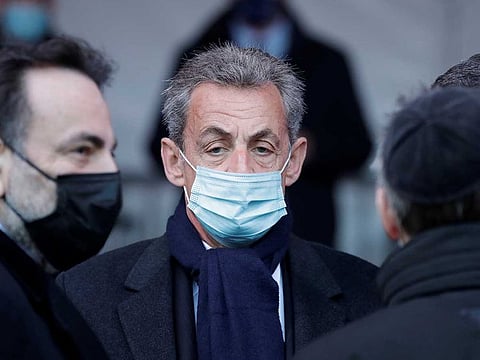Campaign finance trial opens for French ex-president Sarkozy
Sarkozy became France’s first postwar president to be sentenced in March for graft

Paris: Former French president Nicolas Sarkozy goes on trial Thursday over claims of illicit financing for his failed 2012 re-election campaign, just weeks after the rightwing heavyweight was convicted in a landmark corruption trial.
Sarkozy, 66, became France’s first postwar president to be sentenced to prison when judges gave him a three-year term in March for corruption and influence peddling, though under sentencing rules he will not spend any time behind bars.
In Thursday’s proceedings, he and 13 others are accused of setting up or benefiting from a fake billing scheme to cover millions of euros in excess spending on campaign rallies to fend off his Socialist rival Francois Hollande.
Prosecutors say accountants had warned Sarkozy that the campaign was set to blow past the 22.5 million euro ($26.7 million) spending cap, but that he insisted on holding more events.
Eventually the campaign spent nearly 43 million euros, though Sarkozy says he was unaware of the scheme - unlike some of the defendants he is not charged with fraud, but with the lesser offence of illegal campaign financing.
If convicted, he risks up to a year in prison and a fine of 3,750 euros.
The trial was originally set for March but was postponed after a lawyer for a key witness was hospitalised with Covid-19. It is now set to run until June 22.
It was not clear if Sarkozy would appear in court when the trial opens in Paris on Thursday afternoon, but he has been ordered to appear for questioning the week of June 14.
‘Runaway train’
The case is one of several to have dogged Sarkozy since he left office and which have torpedoed hopes among his allies that he could muster a comeback and challenge Emmanuel Macron for the presidency next year.
He has denied any wrongdoing, saying he is the victim of a vindictive judicial system that widely opposed his reform efforts while in power from 2007 to 2012.
He has appealed the corruption conviction, handed down after a judge ruled he plotted with his former lawyer and friend Thierry Herzog to obtain and share confidential information from a judge an inquiry into Sarkozy’s 2007 campaign financing.
The latest case is known as the Bygmalion affair, after the name of the public relations firm hired to orchestrate a blitz of elaborately staged rallies when polls showed that Sarkozy’s 2012 re-election was far from assured.
Bygmalion executives have acknowledged a system of fake invoices to pass the bills to Sarkozy’s UMP party, since renamed Les Republicains, including the deputy manager of the campaign, Jerome Lavrilleux.
Lavrilleux made headlines in 2014 after he tearfully confessed to the scam during a French TV interview, saying: “This campaign was a runaway train that no one had the courage to stop.”
Campaign officials refused to reimburse the spending after investigators discovered the fraud, prompting the UMP to launch a “Sarkothon” that raised 11 million euros towards his costs.
Sarkozy, who married the singer and former model Carla Bruni while in office, is also facing charges that he received millions of euros from the former Libyan dictator Muammar Gaddafi for his 2007 election campaign.
And in January, prosecutors opened a probe into alleged influence-peddling involving his activities as a consultant in Russia.
Yet Sarkozy remains a popular figure on the right, attracting long lines of fans last summer seeking autographs of his latest memoir, “The Time of Storms,” which topped best-seller lists for weeks.
Sign up for the Daily Briefing
Get the latest news and updates straight to your inbox








